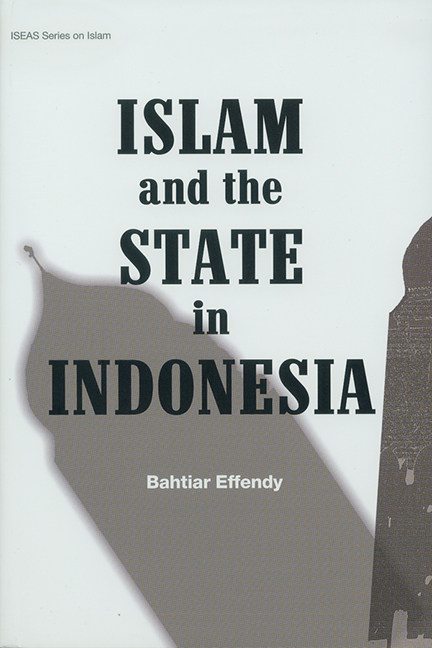Book contents
- Frontmatter
- Dedication
- Contents
- Abbreviations
- Acknowledgements
- Chapter 1 Introduction: The Problem of Political Relationship between Islam and the State
- Chapter 2 Explaining the Uneasy Relationship: Political Antagonism between Islam and the State in Indonesia
- Chapter 3 Emergence of the New Islamic Intellectualism: Three Schools of Thought
- Chapter 4 Implications of the New Islamic Intellectualism: Ideas and Practices
- Chapter 5 Beyond Parties and Parliament: Reassessing the Political Approach of Islam
- Chapter 6 Reducing Hostility: The Accommodative Responses of the State
- Chapter 7 Conclusion: Towards an Integrated Political Relationship between Islam and the State
- Chapter 8 Political Islam in Post-Soeharto Indonesia: A Postscript
- Bibliography
- Index
- About the Author
Chapter 3 - Emergence of the New Islamic Intellectualism: Three Schools of Thought
Published online by Cambridge University Press: 21 October 2015
- Frontmatter
- Dedication
- Contents
- Abbreviations
- Acknowledgements
- Chapter 1 Introduction: The Problem of Political Relationship between Islam and the State
- Chapter 2 Explaining the Uneasy Relationship: Political Antagonism between Islam and the State in Indonesia
- Chapter 3 Emergence of the New Islamic Intellectualism: Three Schools of Thought
- Chapter 4 Implications of the New Islamic Intellectualism: Ideas and Practices
- Chapter 5 Beyond Parties and Parliament: Reassessing the Political Approach of Islam
- Chapter 6 Reducing Hostility: The Accommodative Responses of the State
- Chapter 7 Conclusion: Towards an Integrated Political Relationship between Islam and the State
- Chapter 8 Political Islam in Post-Soeharto Indonesia: A Postscript
- Bibliography
- Index
- About the Author
Summary
If Islam is to be preserved as a social and political force in Indonesia, someone will have to serve as cultural mediator between that Islam and the new national culture of Indonesia.
Leonard BinderThe development of Indonesia's new Islamic intellectualism over the past two decades can be considered crisis-determined. Its general tone has been influenced and shaped by the debilitating situation of political Islam and the devastating repercussions this has had on its thinkers and activists. These unfavourable circumstances have emerged mainly, though not wholly, due to the poor political relationship between Islam and the state and the resulting socio-cultural and political synthesis of Islam within the framework of the state.
For reasons discussed below, the rise of this new Islamic intellectualism can be seen as representing a promising attempt to remedy the discouraging disjunction between Islam and the state. So far, these efforts have been primarily carried out through enunciations of new Islamic political thoughts and actions which are perceived to be more compatible with Indonesia's socio-cultural and religious heterogeneity.
These intellectual endeavours have been led by a new generation of Islamic thinkers and activists who, since the early 1970s, have sought to develop a new format for political Islam in which substance, rather than form, serves as the primary orientation. In the model which these new intellectuals espouse, the notion of “Islamic-ness” and “Indonesia ness”— two important elements which provide cultural as well as structural legitimacy to the construct of Indonesia's “national unitary state” — is harmoniously synthesized and integrated.
As indicated in their intellectual discourse, this agenda requires (1) re-examination of the theological or philosophical underpinnings of political Islam; (2) redefinition of the political objectives of Islam; and (3) reassessment of the ways by which those political ideals can be effectively realized.
The main tasks of this chapter and the following two chapters are as follows: chapter 3 will describe the pronouncements of the new Islamic intellectualism. The broad tenets of this idealism and activism can be categorized as revolving around three important areas: (1) theological/ religious renewal; (2) political/bureaucratic reform; and (3) social transformation.
- Type
- Chapter
- Information
- Islam and the State in Indonesia , pp. 65 - 101Publisher: ISEAS–Yusof Ishak InstitutePrint publication year: 2003

